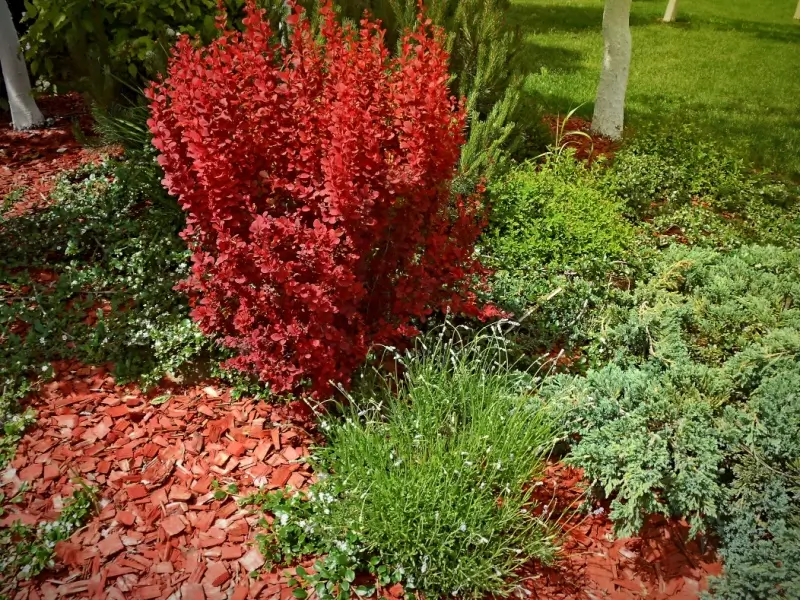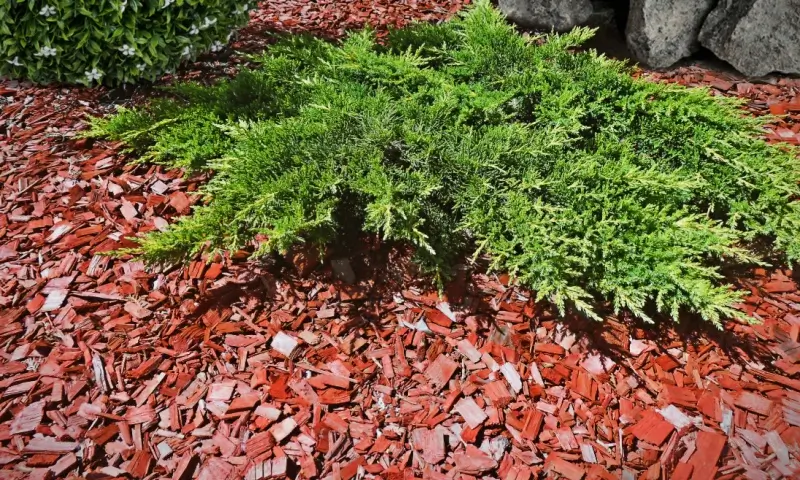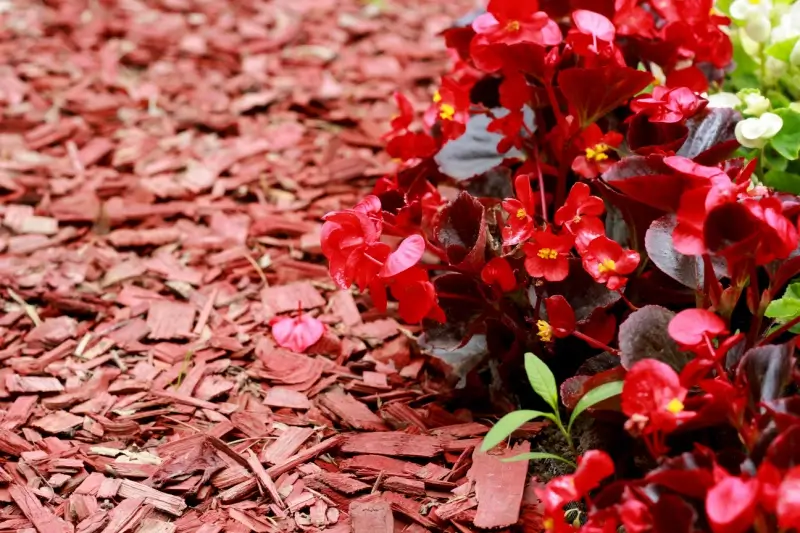The Pros and Cons of Cedar Mulch

Cedar trees are a mainstay of the Canadian forests, and their beautiful reddish-brown wood is a popular option for shingles, fencing, and decks. Another common use of cedar is mulch. Many homeowners and property managers prize cedar mulch for its gorgeous colour, durability, and pleasant, woodsy aroma. You may have even heard that cedar can repel several annoying insects.
Is there any truth to this rumour? More importantly, is cedar mulch the right choice for your landscape? We’ll review the pros and cons of cedar mulch and explain if it truly can repel insects.
Table of Contents:
What Is Cedar Mulch?
If you leave your soil to the mercies of the open air, it can quickly dry out, erode, or get overtaken by weeds. How does mulch benefit your soil? Mulch protects your garden's soil and adds character and beauty to your landscape. You can also use mulch around shrubs, trees, walkways, patios, and more.
Learn more about where and why you need mulch.
When it comes to mulching your property, you have several different types of mulch to choose from, including wood chips, bark, cypress mulch, pine needles, stone, gravel, and even rubber mulch. A perennially popular option is cedar mulch. As you can guess, this mulch is made from the bark of cedar trees.
Undyed cedar mulch is an attractive, reddish-brown colour that is known for its strong, pleasant aroma. It can also be dyed in other colours, like black and brown to add a stark contrast to your existing landscape.
Cedar Mulch Pros and Cons
With several options of mulch to choose from, it’s important to understand the pros and cons of cedar mulch before making a decision. Here are some of the important pros and cons associated with cedar mulch.
Pro: Durability
All organic mulches eventually break down, but cedar mulch is among the longest-lasting options. It can typically last three to four years before it needs to be completely replaced, giving you a lot of bang for your buck.
Con: Colour Fade
Though cedar mulch can last several years, its colour will fade sooner, especially when exposed to direct sunlight for extended periods. The UV rays of the sun and harsh winter will bleach away the mulch’s rich colours within a few seasons. One way to fight colour fade is to add a thin top layer of new cedar mulch at the start of each season.
Pro: Weed Control

Like all mulches, cedar mulch effectively controls weeds, helping to prevent weed seeds from germinating and breaking through to the surface. This makes cedar mulch a good option for areas where you wish to keep clear of stubborn weeds.
Con: Allelopathic Properties
Cedar wood contains an allelopathic compound called thujone. As cedar mulch breaks down, it can release the compound into the soil, which may hurt the seed germination and root growth of some plants. (Allelopathy is a process by which a plant releases chemicals that can influence the growth and development of neighbouring plants.)
Because of its allelopathic properties, there are some areas where cedar mulch should not be used. So, when should you not use cedar mulch? It’s best not to use it around young seedlings or plants, since their health and development could be negatively impacted by higher levels of thujone.
Pro: Moisture Retention and Temperature Control
All mulches help soil retain moisture by reducing evaporation. This can assist plants in growing deeper roots and support them during the dry times of the year. In addition, mulch helps mitigate the effects of extreme temperature changes on plants and soil. A layer of mulch serves as an insulating barrier against hot and cold temperatures, which is important when you consider the seasonal changes that occur throughout Canada’s various regions.
Con: Expense
Cedar mulch is more costly than most other types of organic mulch. If your main priorities are weed control and moisture retention, you will likely save money on less expensive options. You should also consider the size of the area you want to mulch. For larger areas, it might be best to go with a cheaper mulch as your base, then add a thin layer of cedar on top to achieve the desired look.
Pro: Beautiful Look

One of the main reasons so many homeowners and property managers choose cedar mulch is its attractive appearance and rich colouring. Cedar mulch adds an impressive finishing touch to gardens and walkways, while complementing various plant colours and textures.
Does Cedar Mulch Repel Bugs?
Like many garden lore, there isn’t much data to support the belief that cedar mulch repels insects. However, that doesn’t stop many gardeners and landscapers from swearing by the repellent properties of cedar mulch. Many believe the natural oils found in cedar wood, specifically thujone, give off a scent that certain insects don’t like.
Research indicates that cedar is effective at repelling the following insects:
- Ants
- Mosquitoes
- Termites
- Cockroaches
- Certain moths
So, does cedar mulch repel bugs? You’ll need to put some down to test the theory yourself.
How Long Does Cedar Mulch Repel Bugs?
Whether or not cedar mulch turns repels insects is still up for debate. However, if there is any truth to the rumor, it makes sense that it would work best when the mulch is fresh, and the natural oils in the wood are at their highest level. The aroma of cedar mulch is strongest when it is fresh, which typically lasts for several months.
Over time, you might notice the insect-repelling properties of cedar mulch fading as the oils gradually evaporate and the scent diminishes. At this point, you may want to refresh your cedar mulch with a new layer to help beat back the bugs and add more colour to the mulch.
Does Cedar Mulch Repel Pollinators?
If cedar mulch truly repels insects, it’s fair to ask if cedar mulch repels pollinators as well. The good news is that there’s no definitive evidence that suggests that cedar mulch will keep pollinators out of your yard. In fact, many beehives built for honey bees are made from cedar wood, so it is very unlikely that it is harmful to some of nature’s best pollinators.
One thing to consider when using cedar mulch for gardens is, cedar mulch’s allelopathic properties might not be the best option to include in your pollinator garden. It may harm some of the flowers and plants pollinators rely on for their food.
Need Help Choosing the Right Mulch?
Now that you know some of the primary cedar mulch pros and cons, it’s time to decide if cedar mulch is right for your landscape. If you need help choosing the right mulch for your property, the local experts at The Grounds Guys® can help. Our teams, located throughout Canada, offer commercial and residential mulching services in addition to other lawn care and landscape services. We can also help you plan, design, and implement landscape and hardscape, including mulched hardscapes, to add new visual elements to your property.
To get started, request a free estimate today!
This article is intended for general guidance only and is not applicable to every situation. You are responsible for determining the proper course of action for your property and situation. The Grounds Guys are not responsible for any damages that occur as a result of advice and/or guidance derived from its blog content.
The Grounds Guys services may vary by location. Please contact The Grounds Guys franchise nearest you for more information.
 Click to call
Click to call


